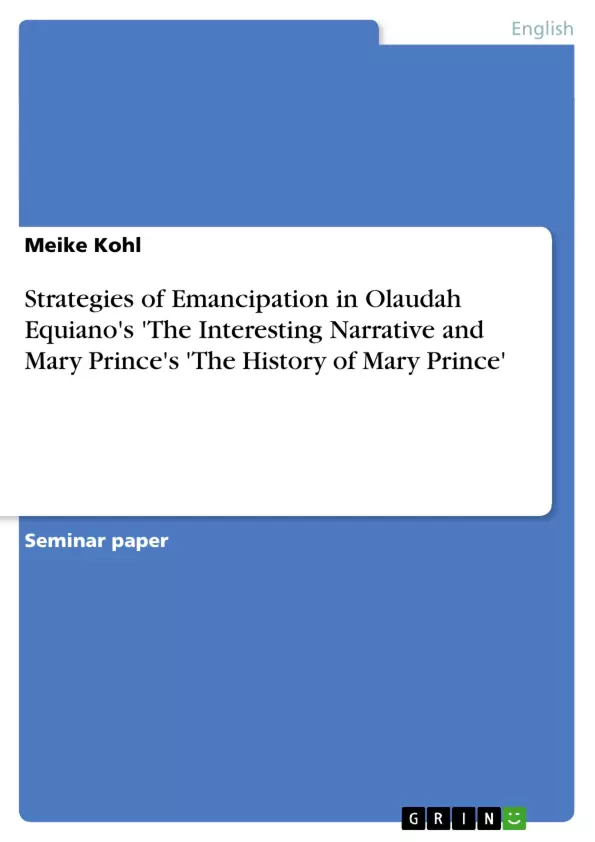As representatives of Early Black Literature, two texts have entered the canon of university courses lately: Olaudah Equiano’s The Interesting Narrative Of The Life Of Olaudah Equiano Or Gustavus Vassa, The African, Written By Himself, which was published in 1794, and Mary Prince’s The History Of Mary Prince. A West Indian Slave which was first published in 1831. Both at their time have been drawing the attention of the British public to the cause of abolition and have ultimately been a means to finally establish the legal rights of the enslaved. This essay attempts to establish a connexion between the individual strategies of emancipation as utilised by the two individuals in their struggle for freedom, and the way these strategies are reflected on a literary level, that is the use of language and of narrative genres. It will be examined in how far Equiano and Prince act as agents of a free will and present themselves as such, with a focus an the means by which this is done. In a second step, the literary level will be analysed, that is the use of narrative strategies and language in both texts with regard to popular literary genres in eighteenth century literature. The approach Equiano chooses on his way to becoming a free individual can be described as an indirect tactic of adapting to a new culture. It is reflected on the literary level, as well as Prince’s direct and outspoken attempts at emancipation. The outcomes of both authors’ endeavours differ greatly, and so do their strategies and literary uses. The Webster Dictionary defines emancipation as the act of setting free from the power of another, from slavery, subjection, dependence, or controlling influence; also, the state of being thus set free; the act or process of emancipation, or the state thereby achieved; liberation; as, the emancipation of slaves; the emancipation of minors; the emancipation of a person from prejudices; the emancipation of the mind from superstition; the emancipation of a nation from tyranny or subjection. In this essay, ‘strategies of emancipation’ will be defined as strategies being followed consciously or unconsciously to achieve a state of independence, legally and socially. The term ‘agency’ signifies an active role of the protagonist which is not restricted or forced upon by others.
Inhaltsverzeichnis (Table of Contents)
- Introduction
- Individual Strategies of Emancipation: Olaudah Equiano
- Adaption to a foreign cultural system
- The Liberal Economic System
- Emancipation through Religion
- Individual Strategies of Emancipation: Mary Prince
- Protest against the System of Slavery
- Economic System
- Religion
- Strategies of Emancipation in Literary Terms
- Equiano
- Spiritual autobiography
- Fictional Autobiography
- Travel writing / Adventure story
- The Sentimental Novel
- Prince
Zielsetzung und Themenschwerpunkte (Objectives and Key Themes)
This essay aims to explore the relationship between the individual strategies of emancipation employed by Olaudah Equiano and Mary Prince in their fight for freedom and the way these strategies are reflected in their literary works. The essay will examine how Equiano and Prince present themselves as agents of free will and the methods they use to achieve this. It will also analyze the narrative strategies and language used in both texts in relation to popular literary genres of the eighteenth century.
- Strategies of emancipation employed by Equiano and Prince
- The role of language and narrative genres in representing emancipation
- The impact of cultural adaptation and the economic system on emancipation
- The influence of religion and spiritual development on the quest for freedom
- The different outcomes and literary uses of Equiano and Prince's endeavors
Zusammenfassung der Kapitel (Chapter Summaries)
The essay begins by introducing Olaudah Equiano's The Interesting Narrative of the Life of Olaudah Equiano or Gustavus Vassa, The African, Written By Himself and Mary Prince's The History of Mary Prince, A West Indian Slave as significant texts in Early Black Literature. It then delves into the individual strategies of emancipation employed by Equiano, focusing on his adaptation to a foreign cultural system, his utilization of the liberal economic system, and his emancipation through spiritual development. The chapter concludes by discussing Equiano's language acquisition as a tool for both adaptation and resistance.
Schlüsselwörter (Keywords)
The key concepts explored in this essay include strategies of emancipation, agency, cultural adaptation, economic system, religion, spiritual development, literary genres, narrative strategies, and the representation of freedom in eighteenth-century literature.
Frequently Asked Questions
What are the main strategies of emancipation for Olaudah Equiano?
Equiano utilized an indirect strategy of cultural adaptation, including mastering the English language, navigating the liberal economic system to buy his freedom, and finding liberation through Christian spiritual development.
How does Mary Prince's approach to emancipation differ from Equiano's?
Unlike Equiano's indirect adaptation, Mary Prince's strategy was more direct and outspoken, focusing on open protest against the cruelties of the slave system and highlighting the physical and emotional suffering of enslaved women.
What narrative genres did Equiano use in his writing?
Equiano's narrative combines several 18th-century genres, including spiritual autobiography, fictional autobiography, travel writing, adventure stories, and elements of the sentimental novel.
What does 'agency' mean in the context of early black literature?
Agency signifies an active role where the protagonist acts according to their own free will, presenting themselves as independent individuals despite the restrictions forced upon them by slavery.
How did these narratives influence the British public?
Both texts were crucial in the abolitionist movement, drawing public attention to the cause of ending slavery and ultimately helping to establish legal rights for enslaved people.
- Arbeit zitieren
- Meike Kohl (Autor:in), 2006, Strategies of Emancipation in Olaudah Equiano's 'The Interesting Narrative and Mary Prince's 'The History of Mary Prince', München, GRIN Verlag, https://www.grin.com/document/71453



